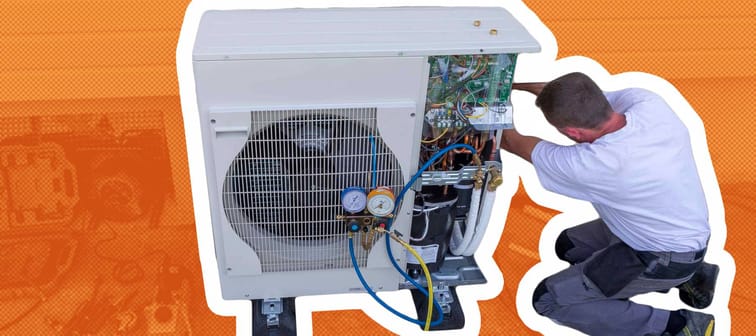Heat pump federal tax credit 2022
For heat pumps installed in 2022, there is a tax credit of 10% of the cost of a heat pump, up to $500 or a specific amount from $50-$300.
Meet Your Retirement Goals Effortlessly
The road to retirement may seem long, but with WiserAdvisor, you can find a trusted partner to guide you every step of the way
WiserAdvisor matches you with vetted financial advisors that offer personalized advice to help you to make the right choices, invest wisely, and secure the retirement you've always dreamed of. Start planning early, and get your retirement mapped out today.
Get StartedHeat pump federal tax credit 2023
Starting in 2023 through the end of 2032, all homeowners will be eligible for a 30% federal tax credit on the total cost of buying and installing their new heat pump, with a maximum credit of $2,000.
The High-Efficiency Electric Home Rebate Act — part of the The Inflation Reduction Act — can also help you offset the cost of purchasing a heat pump — depending on your income.
You could be eligible for up to $1,750 for a heat-pump water heater and $8,000 for a heat pump for space heating if your household income is less than 150% of your state’s median income.
More: Best tax filing software
Heat pump state rebates
If your household income is less than 80% of your state’s median household income, then you qualify for the full rebate — meaning if you purchase both the heat pump and heat pump water heater, you could get $9,750 back.
If you make between 80 to 150% of your state’s median income, you’re eligible for 50% of the rebate — so you could get up to $4,875 back.
You might be able to claim some other state-administered rebates associated with making efficiency upgrades to your home when installing your heat pump.
Stop overpaying for home insurance
Home insurance is an essential expense – one that can often be pricey. You can lower your monthly recurring expenses by finding a more economical alternative for home insurance.
SmartFinancial can help you do just that. SmartFinancial’s online marketplace of vetted home insurance providers allows you to quickly shop around for rates from the country’s top insurance companies, and ensure you’re paying the lowest price possible for your home insurance.
Explore better ratesCan a heat pump save you money?
The best cost-comparison for a heat pump is the electric baseboard heater, says Modi. This system can supply and control the heat in individual rooms.
Heat pumps don’t burn fuel, but use electricity to move warm air in or out of the house. They both heat and cool your home and can significantly cut down on your carbon dioxide emissions.
The baseboard heater is much cheaper to install, but will cost you more in energy use over the long term.
If you’re comparing an electric heat pump to a gas furnace, they’re better for the environment — they can reduce your household carbon dioxide emissions by 38 to 53% — but whether they actually save you money can depend on a few variables.
The estimated cost of heating a home with natural gas is projected to jump more than 34% from last winter, to $952 this winter, reports the National Energy Assistance Directors Association.
But, Modi says you need to compare the price of both electricity and gas in your area.
“Right now in New York City I'm paying about, retail price, of $20 per million Btu for gas. The rate I'm paying for electricity is such that it’s the equivalent of $85 per million Btu now.”
Btu, or British thermal units, is the most common unit for comparing energy sources or fuels in the U.S. One Btu roughly amounts to the energy released by burning a match, according to the U.S. Energy Information Administration.
So, if the heat pump is three to four times more efficient compared to the furnace, but electricity ends up being five times more expensive than the cost of gas in your area, then you won’t be saving money with a heat pump.
According to a Consumer Reports survey, members paid an average of $7,791 for a heat pump system compared with $6,870 for a gas furnace — however the price of installing a heat pump can be even more costly in areas with colder climates.
More: How to save money on your utility bills
What do homeowners need to know before getting a heat pump?
It’s important to speak to more than one provider, get a few quotes and do some research on which brands are more reliable, says Modi. And you don’t need to switch to all-electric all at once.
“You can consider upgrading your electricity service to 220V/240V inside your home at one shot, even though you may go electric for space heating, domestic hot water, dryer or cooking progressively.” Modi recommends upgrading your service especially if your furnaces or boilers have exceeded their lifespan and you need to replace them anyway.
You should also think about whether your neighborhood is at a higher risk of power outages and plan for what you can do if the power goes out.
“It's one thing to be without electricity for light, it's another thing to not have heat,” he adds.
A 2021 study says nearly a third of U.S. houses would “benefit economically” from installing a heat pump — the benefits depend on your electric grid, climate, prior heating fuel and housing characteristics.
For example, it would be more cost-effective for most homes to switch from propane or the baseboard as a heating source to the heat pump.
The study finds that switching from natural gas to the heat pump “rarely produces a benefit” especially in colder climates when they operate at lower efficiency.
However, other sources say that cold-climate and ground-source heat pumps are reliable and effective in cooler regions — though more expensive to buy and install compared to other heat pump models.
Consumer Reports notes that heat pumps, like any other heating system, become more costly to install and operate if your home is drafty or leaky.
Modi suggests that one option is to get some basic weatherization done in your home — such as improving the insulation — to help you cut down on the cost of heating.
You could also consider using oil or gas as a backup for colder days or when the power grid gets disrupted.
And don’t forget to look into whether your locality or state offers any other financial incentives for making energy efficient upgrades to your home.
You could potentially save on those upfront costs by applying for tax credits or rebates.
More: Money-saving tricks every homeowner needs to know
Sponsored
Follow These Steps if you Want to Retire Early
Secure your financial future with a tailored plan to maximize investments, navigate taxes, and retire comfortably.
Zoe Financial is an online platform that can match you with a network of vetted fiduciary advisors who are evaluated based on their credentials, education, experience, and pricing. The best part? - there is no fee to find an advisor.







